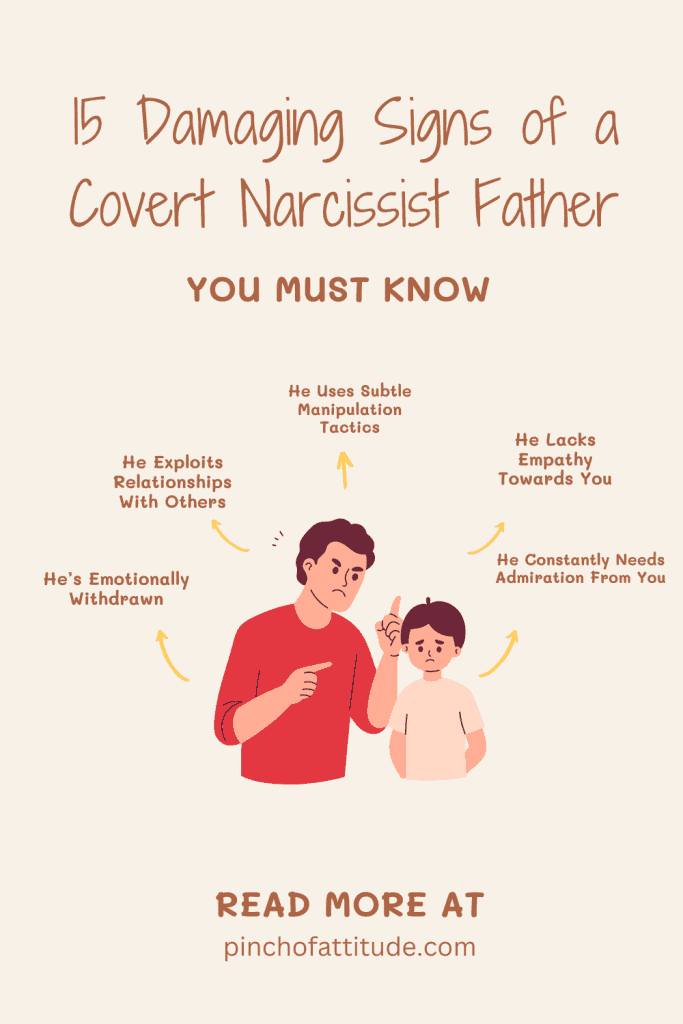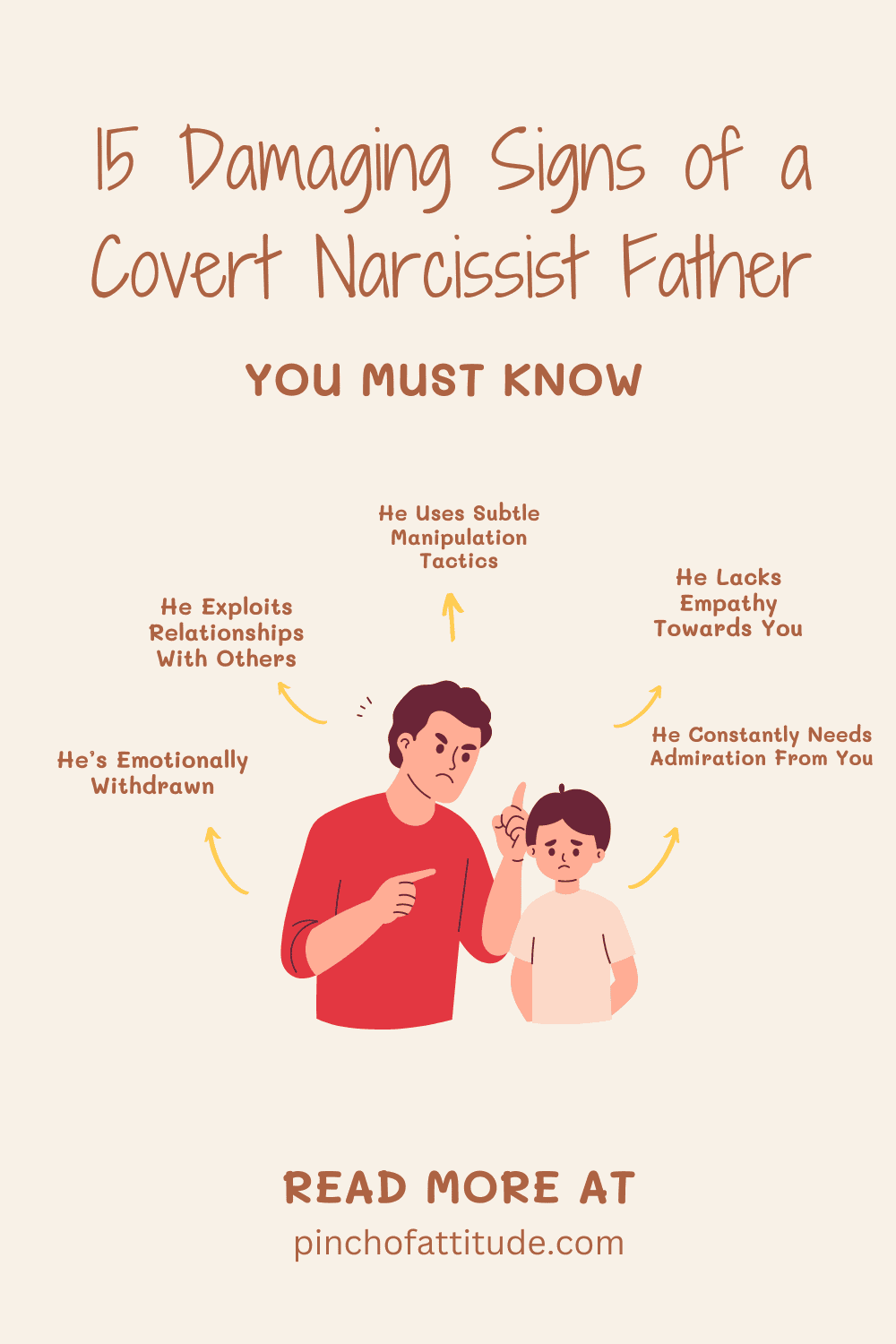Let’s talk about dads. Not the grill-master, football-loving kind, but the ones who leave an emotional bruise instead of a high five.
You know the type: the master of manipulation who can charm a roomful of strangers while leaving their kids feeling like shadows.
I grew up with a mom who’s a textbook narc, but the mind games of a covert narcissist dad are a whole different ballgame.
My cousins know what I mean. Their dad, a master of disappearing acts, left them young, his absence a constant ache.
So, why are we talking about these guys? Because sometimes, the most damaging patterns hide in plain sight.
Below, we’re cracking the code on 15 covert narcissist father signs you absolutely need to know.
- Full of charm, covert narcissist fathers wield emotional control like a hidden blade. They use veiled criticism and emotional manipulation to bend your reality.
- Children of covert narcissists may develop self-doubt and a constant hunger for validation. This can impact their relationships and self-worth.
- To heal from the trauma, set firm boundaries, prioritize self-care, and seek professional help.
Table of Contents
15 Covert Narcissist Fathers Signs You Should Know

Is your dad well-known for throwing subtle digs and then playing the victim? Does he give you backhanded compliments and downplay your achievements?
I get it. I’ve experienced these firsthand with my mother, too. But I learned that these subtle snubs and emotional side-steps are just the tip of the iceberg.
Here are 15 often hidden but undeniable signs of a narcissistic parent:
1. He Uses Subtle Manipulation Tactics
Imagine bubbling with excitement about a new passion project and your dad saying something dismissive like, “That’s a waste of time, you know.” Sound familiar?
That’s how a covert narcissist parent uses manipulation such as dismissal to make you doubt your decisions.
These masters of mind games don’t yell or scream. They play the long game.
Think back: Has Dad ever downplayed your successes, attributing them to luck? These seemingly harmless barbs are calculated moves designed to keep you under their emotional thumb.
2. He Lacks Empathy Toward You
Remember that time you were devastated after your first heartbreak? Or the crushing disappointment of a missed opportunity?
If your dad’s response was a blank stare or a dismissive shrug, then you’ve likely experienced the chilling lack of empathy that often defines a narcissist.
Growing up with a covert narcissistic parent myself, I know this feeling all too well.
My mom would brush off my anxieties with a dismissive, “Don’t be dramatic.” It’s like she has a special filter on, one that blocks out my pain and amplifies her own.
It isn’t because they are heartless monsters (okay, maybe some are), but because their world revolves around themselves.
Tip
Don’t blame yourself. His lack of empathy is a sign of his emotional limitations, not your fault.
3. He Constantly Needs Admiration From You
Ever feel like your dad lives for applause? Like every achievement you have is just fuel for his “Look how amazing MY kid is!” parade?
Yeah, you’re not alone. It’s common for children of narcissistic parents to become personal trophies, constantly expected to rack up accomplishments.
Every success, big or small, is just a ticket to their validation booth.
It’s exhausting feeling like you’re constantly performing, trying to win the gold medal of their approval.
But their need for admiration isn’t about you, it’s about them.
4. He Exploits Relationships With Others
Among the most common covert narcissist father traits is their knack for weaponizing relationships.
He’ll sabotage your friendships, planting seeds of distrust to keep you isolated and dependent on him.
It’s like he’s jealous of any connection that takes the spotlight away from him, even if it’s just a child’s innocent friendship.
My mom used to turn friends against me with subtle whispers and exaggerated stories.
At home, she pitted my siblings and me against each other, creating this scapegoat vs. golden child dynamic.
Over time, I realized that a good parent builds you up, not tear you down by playing favorites.
5. He’s Emotionally Withdrawn
In the world of a covert narcissist dad, warmth and connection are rare. While this coldness can manifest in different ways, one of the most damaging is simply… being absent.
My cousins, for example, were abandoned by their dad when they were barely toddlers.
That is a stark example of how a covert narcissist parent may inflict the silent but deadly wound of emotional abuse and neglect.
This withdrawal isn’t always a dramatic exit like my cousins experienced. It can be a slow, insidious fade, where Dad physically shows up but emotionally checks out.
Don’t mistake this detachment for disinterest. In truth, it’s about making you crave their approval, even if it means living in emotional limbo.
6. He’s Overly Critical and Judgmental Towards You
I remember a time when I nailed a presentation at work and told my mom about it.
But instead of a proud smile and a high five, she dissected every sentence and nitpicked on minute details.
If you feel like your accomplishments are always put on trial, then you probably have a narcissistic dad.
This constant barrage of criticism, cloaked in the guise of “constructive feedback,” can chip away at your self-confidence.
He thrives on your self-doubt and wants you reliant on his “superior” judgment, but don’t fall for the act.
His hurtful jabs aren’t about genuine improvement. They are about maintaining control and keeping you small.
Tip
This negativity isn’t a reflection of you. It’s a symptom of his insecurity and need for power.
7. He Gaslights You
A covert narcissist is also a master of gaslighting, where they rewrite reality and twist your sense of truth.
Remember my cousins? Their dad, the one who vanished into thin air, reappeared when their careers took off, expecting a ready-made retirement plan.
He tried to downplay his absence, claiming it was “for their own good” and that he has “always loved them.” This left my cousins drowning in feelings of guilt and confusion.
Suddenly, their clear recollection of his neglect became “misinterpreted,” their justified anger turned into “overreacting,” and his abandonment was painted as a sacrifice.
But this is gaslighting at its finest, a mind game designed to invalidate your experiences and make you question your thoughts and feelings.
8. He Displays Superficial Charm
Picture this: Your dad walks into a party with his charisma and witty jokes. Everyone hangs on his every word and is mesmerized by his magnetism.
But when the spotlight fades and you’re alone with him, the warmth evaporates.
He’ll shower you with affection in public, bask in the reflected glory of your achievements, and then retreat to his emotional island when the spotlight fades.
If your dad’s charm feels performative, like a character he puts on for the audience, recognize it for what it is.
It’s a facade masking deeper narcissistic traits.
9. He’s Very Unreliable
Is your dad the type to cancel a trip at the last minute, citing some vague excuse?
For sons and daughters of narcissistic fathers, this isn’t a one-time thing but a common occurrence.
Growing up, my cousins would tell me how their dad would promise weekend outings and exciting trips, only to leave them hanging with a flimsy excuse and a hollow apology.
This unreliability isn’t just about forgetfulness. It’s a symptom of the deeper problem at play – covert narcissistic personality disorder or NPD.
A narcissist always prioritizes their own desires, leaving you holding the empty bag of broken promises.
Remember that true fathers show up, not through grand gestures, but in the everyday moments of trust and consistency.
10. He Projects His Faults Onto You
Do your wins launch your dad into a tirade about his unappreciated talents? It’s as if your success reminds him of his failures.
This projection happens subtly but stings deeply. It can leave the child feeling like a walking emotional sponge, soaking up all the negativity.
You can’t win. He expects you to either apologize for his bad mood or take responsibility for his outburst.
His projections are not your burden to bear. They’re a symptom of his inability to face his shortcomings.
Tip
Refuse to play the scapegoat. If your dad throws his emotional baggage at you like it’s your fault, start setting boundaries.
11. He Loves to Control Everything About You
Growing up, my mother was the queen of “helpful” advice. She would offer suggestions left and right, but they all veered toward the path she wanted me to take.
As I matured, I learned that it wasn’t because she wanted to give genuine guidance. It’s so she could exert ongoing control.
Does that sound like your dad?
Sure, he might say it’s just him being protective, but what a covert narcissist wants is control over all aspects of your life.
This desire stems from a deep-seated sense of entitlement. He sees you as an extension of himself, after all.
12. He Exhibits a Grandiose Sense of Self
Grandiosity masked as humble brags or subtle self-aggrandizement is another one of the common covert narcissistic father qualities.
He might pepper conversations with anecdotes about his “genius” solutions or his “unparalleled” skills, all while subtly implying that your accomplishments pale in comparison.
This constant one-upmanship isn’t a harmless quirk. It’s a symptom of deep-seated insecurity masked by bravado.
He needs to feel superior, his ego an insatiable beast that devours any crumb of praise you might earn.
But don’t fall for the glitter of his self-proclaimed brilliance. A good father celebrates his children’s victories, not belittle them.
13. He Has a Difficulty Accepting Criticism From Anyone

My mother would melt down at the slightest hint of constructive criticism.
She would go to great lengths to deflect, deny, or worse, turn my suggestion into a personal attack.
This inability to accept even a simple critique is a hallmark of covert narcissism. But my therapist helped me realize that it’s not my responsibility to tiptoe around her fragile ego.
If your dad’s response to any suggestion is a wall of defensiveness or a barrage of justifications, that’s on him.
You deserve to express yourself without fearing his volcanic meltdowns.
14. He Loves to Emotionally Blackmail You
Imagine having an absentee dad suddenly reappearing with tearful apologies and promises of “changing.”
He spins self-sacrificing tales and paints himself as the victim of circumstance, guilt-tripping you with lines like, “Don’t you want to be there for your only father?”
That’s the exact game my uncle is trying to play.
He’s playing up the long-suffering martyr routine, expecting my cousins to validate his narrative and accept him back, no questions asked.
But my cousins, raised by their strong mom, saw through the facade. They understood that true love isn’t conditional and doesn’t require emotional extortion.
Tip
A covert narcissistic dad thrives on your desire to please. Don’t let him play the victim. Recognize your worth and set boundaries to protect your well-being.
15. He Displays an Inflated Ego
You know that dad who wins every board game, even when the rules get a little… flexible? That’s the inflated ego of a covert narcissist dad in action.
The thing is, he doesn’t just brag, he subtly weaves his “perfection” into every conversation.
He’ll offhandedly mention his “flawless” golf swing while “helping” you with yours, or casually drop how he aced that calculus test “back in my day” while you struggle with fractions.
It’s like he constantly needs to look good by comparison, even when there’s no competition. Deep down, though, it’s all a mask.
A narcissist feels threatened by anything that might make him look, well, normal. So they inflate their strengths and shrink your own.
It’s a never-ending game of one-upmanship, and the only way to win is to not play.
How Does a Covert Narcissist Father Groom You for Abuse?
Covert narc fathers can groom their children for narcissistic abuse in subtle yet damaging ways. These can involve warping reality, invalidating emotions, and creating a dependence on their approval, all of which make it difficult to recognize the abuse.
Some children of a narcissistic parent may have even been groomed from infancy to accept narcissistic behavior as normal.
Here are some of the manipulative tactics these fathers use:
- Conditional love: The dad’s affection and approval fluctuate based on the child’s behavior or ability to fulfill his needs. This creates a dynamic of emotional dependence and fear of disapproval.
- Invalidation: The father twists reality, denies the child’s experiences, and dismisses their emotions. This makes them question their perceptions and leads to self-doubt and insecurity.
- Triangulation: The father pits family members against each other. The goal is to isolate the child and make them feel unsupported and alone.
- Exploitation: The child’s talents, achievements, or even weaknesses are used for the father’s agenda or to maintain control, leaving the child feeling like an extension of him rather than an individual.
If you identify with these experiences, don’t hesitate to reach out to a mental health professional, support groups, or resources dedicated to narcissistic abuse recovery.
How Does It Feel to Be Under the Spell of a Covert Narcissistic Father?
Living under the spell of a covert narcissistic father feels like constantly walking on eggshells, never knowing what might trigger the next emotional storm or shift in his ever-changing affection.
Good parents want the best for their children, but a narcissistic father prioritizes his own needs and desires.
That’s why children raised by a narcissistic family member grow up feeling unloved, unvalued, and emotionally neglected.
Children often learn to suppress their own emotions, feelings, and even needs in an attempt to avoid conflict or disapproval.
This coping mechanism, learned as a child, can carry over into adulthood.
It can manifest in various ways, including low self-esteem, chronic self-blame, codependency, and difficulty setting boundaries.
To cope with the impacts and start your journey to healing, surround yourself with supportive and understanding people.
Therapists specializing in narcissistic trauma can also help you navigate this journey, providing tools to cope with the emotional scars and rebuild your self-worth.
Related Posts:
- Going No Contact With Your Elderly Narcissistic Father: 13 Tips For You
- Cutting off Your Narcissistic Father: When & How You Should Take Action
- How to Heal From a Narcissistic Father: 11 Helpful Ways So You Can Start Right!
- What Is It Like Growing Up With a Narcissistic Father? Here’s My Story
- How to Defeat a Narcissist Father: 9 Psychological Tips You Can Use Today
Frequently Asked Questions
How do you tell if your dad is a covert narcissist?
Covert narcissists often disguise their behavior. Look for subtle signs like emotional manipulation, lack of empathy, constant need for validation, and a tendency to gaslight.
Can covert narcissist fathers change their behavior?
While change is challenging, some covert narcissist fathers can improve with therapy, self-awareness, and a genuine commitment to personal growth.
Can a covert narcissist be a good dad?
A covert narcissist can display moments of being a good dad. However, long-term consistency in healthy parenting is challenging due to their self-centered traits.
Is it possible to have a healthy relationship with your covert narcissistic father?
Establishing healthy boundaries and seeking therapy can help, but long-term success depends on the father’s willingness to change.
How can you seek support when dealing with your covert narcissistic father?
Reach out! Support groups, therapists, and online communities offer a safe space to process your experiences, learn coping skills, and find healing connections.
Can children of covert narcissist fathers heal from the trauma?
Yes, healing is possible. Therapy, setting boundaries, and self-care can help with your recovery.




